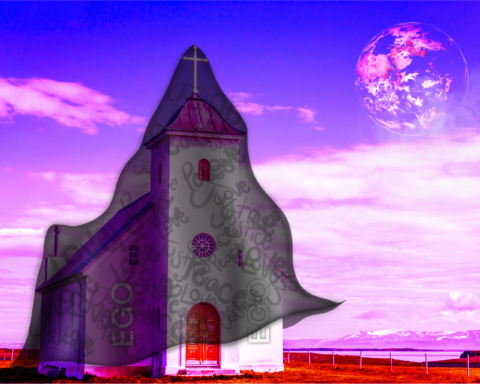
“When you set out on this adventure, you will never be the same.”
These are the grave but hopeful words spoken by Gandalf the Grey to a young hobbit named Bilbo; [1] and thus begins the epic tale of The Hobbit. In many ways, following Christ mirrors this classic tale of a hobbit, twelve dwarfs, and the tall, brim-hatted wizard. We have a destination. We have a leader. There are travails throughout. We travel together. We will never be the same.
But there is more held in common between these two adventures; both also allow us to discover our true selves. Bilbo discovers the adventurous and courageous ‘Took’ side of himself. He discovers that he is resourceful, clever, and wise. He bonds with a bunch of dwarves. We too will discover gifts we never thought we had. We will pray prayers that have never been prayed before. We will go places never dreamed. We will eat different things and learn new tongues. We will welcome as friends those once strangers. In all of this newness, we will not only discover our true selves, we will also discover one another and re-discover the greatness of the One who called us. For of course, it all begins with this One – the God of all times and places, Father, Son, and Holy Spirit. The Caller of the called and the Dreamer who forges unreality into reality.
___________________________________________
It starts with one half-step out of a hobbit’s hole. It begins with a brazen act of courage and goodness in the face of uncertainty and even tyranny. It begins with a holy and passionate “yes” when all the world about screams an unholy “no.”
___________________________________________
So, what is the call? What is the dream? What is this mysterious missio dei that echoes throughout conversations of what it means to be ‘missional’? The answer is simultaneously simple and complex. Quite plainly, God’s mission is to redeem and restore God’s original creation. Mission begins and ends with God’s passionate love for us.
 Yet what comes in between is quite complex. The puzzle has been created; the puzzle has fallen into disorder; and the pieces of the puzzle are now being put together again. These pieces are vast and complicated, comprised with historical and cultural realities, persons and personalities that do not fit well together. Moreover, this mysterious God is always on the move. This wild, untamable madwoman of a God always has something new up her sleeve!
Yet what comes in between is quite complex. The puzzle has been created; the puzzle has fallen into disorder; and the pieces of the puzzle are now being put together again. These pieces are vast and complicated, comprised with historical and cultural realities, persons and personalities that do not fit well together. Moreover, this mysterious God is always on the move. This wild, untamable madwoman of a God always has something new up her sleeve!
Thankfully God’s hutzpah is equaled only by God’s humility. And that, I believe, is where we the Church come in. Honest to goodness, what crazy God would choose the broken fragments of our lives to restore created order? That is what we are, isn’t it? A loose and broken slinky of stubborn and half-blind hopes and ambitions, tangled both good and bad. Why would God stoop so low, work with human matter so frail? Why would this all-powerful God choose to work with us so weak?
Maybe this God knows something we do not. Just as Gandalf saw something in Bilbo, maybe God sees something in us. Maybe we actually have the ‘stuff’ necessary. Maybe we actually have the right DNA to match God’s grand plan for redemption. After all, is it not true that we are made in God’s image? Maybe that means we have a part to play. Maybe it means that we are God’s partners in this gamely plan to rescue and restore created order. We, grafted into the Vine of goodness, love and mercy, climbing over and conquering all.
___________________________________________
Friends, what holes do we need to step out of? From which holes do our congregations need to step forth? What holes do our communities of faith and denominational bodies need to launch beyond?
___________________________________________
And where does it all start? As with Bilbo, it starts with one half-step out of a hobbit’s hole. It begins with a brazen act of courage and goodness in the face of uncertainty and even tyranny. It begins with a holy and passionate “yes” when all the world about screams an unholy “no.” It begins simple and small; Jesus compares it to a mustard seed. In the aftermath of the Rwanda Genocide, it begins with Tutsis and Hutus sitting together and sharing their pain. For churches in the Middle East, it begins with Christians helping and housing refugees. In Brazil, it begins with one woman who sees the needs of the marginalized and destitute. For a church in California, it begins with giving up a day of their typical worship to worship God in a new way, through serving the needs of the community.

For me, it begins in earnest when I hear a man from Rwanda named Antoine Rutayisire speak about the horrors and hopes of his homeland. He speaks passionately about our complicity with evil and unwillingness to stand against injustice. He speaks of God’s love coupled with our need to forgive and love our enemies. Antoine shares with us his love of visiting the prisons of Rwanda, sharing God’s mercy and love with the very people who killed his people. He invites us to come and see. I go, and I see, and I go again. I prayerfully decide to move there. The people of Rwanda and the generosity of Africa now shape my life and faith forever. It begins small. A “yes” buried deep inside. A rediscovery of the One. A half-step taken out of a hobbit hole.
Friends, what holes do we need to step out of? From which holes do our congregations need to step forth? What holes do our communities of faith and denominational bodies need to launch beyond?
Let me name a few that I see: complacency, comfort, control, safety, security, respectability, and affluence. Jesus says, “If any want to become my followers, let them deny themselves and take up their cross and follow me. For those who want to save their life will lose it, and those who lose their life for my sake, and for the sake of the gospel, will save it” (Mark 8:34–35). Jesus turns away an earnest young man because he isn’t willing to part with his wealth. He tells a would-be-follower that “foxes have holes and birds of the air have nests, but the Son of Man has no place to lay his head” (Matthew 8:20).
___________________________________________
There is nothing safe or secure about God’s kingdom. There is no pension plan or stock option or even a house with a yard.
___________________________________________
Jesus’ message is one which comforts the afflicted but afflicts the comfortable. Jesus is not looking for lukewarm watchers to fill the sidelines on the field of life; he is looking for risk takers. The Caller of the called is seeking to put the puzzle pieces back together, and she is looking for helping hands. Everything our western culture prizes are the very things Jesus challenges. There is nothing safe or secure about God’s kingdom. There is no pension plan or stock option or even a house with a yard. There is only this – self-denial, and the promise of eternal reward.

In a climactic scene from the epic film The Hobbit: An Unexpected Journey, Bilbo is forced to tell why he has decided to join this traveling band. He states that while he truly belongs to the Shire, he has joined this risky venture to help the dwarves find and win back their home. It is a moving scene where even the hardest-hearted of dwarves begins to soften. It is a poignant moment, a statement of self-denial and sacrifice for the sake of others. Likewise, Paul tells us, Jesus left all that was known and comfortable. He left his position of glory and made himself like us, submitting to death, even to the shame and dishonor of the cross. Theologian Nestor Medina refers to Jesus’ action as kenosis, the “self-emptying of God”. To show his true power, Jesus gives up all power. God relinquishes privilege, power, and position so that others may be lifted up. Jesus leaves his home that we might find our true home.
Friends, in an age of entitlement, efforts to protect ourselves from the unknown, and self-seeking pleasure, God lays down the gauntlet. There is no easy shortcut on the road that leads to Life. We the Church must give up all for the sake of Christ and his eternal kingdom. None of our sacred cows will escape the flames of God’s lasting judgment. There is the need for urgency. There is the need for prophetic acts and words, speaking truth to power and unjust systems. There is the need for the Church to truly be a hospital for sinners, not a showcase for the saints. There is the need to go beyond what is comfortable and known.
___________________________________________
For our shrinking denominations, may we embrace this change with alacrity and vision. May we consider new structures of being a connectional body that force us to live according to kingdom values.
___________________________________________
In the United States, there is the need for the Church to welcome the immigrant with open arms and to advocate for the refugee. Amongst our church mission committees, there is the need to commit and recommit our pledge to serve worldwide partners through generous giving. There is the need to support our mission workers and long-term volunteers who have left the comforts of home to walk alongside the Majority World Church in places of great physical need. For our aging congregations, there is the need to thank God for God’s generous provision over the decades and to pray about how God might seek to do a new thing among us. For the younger amongst us, there is the need to recognize how the Gospel speaks into our culture and how God’s values shape our lives.

For those of us with white complexion and European ancestry, there is the need to recognize the culmination of the Modern Western Missionary Movement [2] and the dawn of a new era of mission – one in which we in the West are no longer the Apostolic Paul prototypes but rather the Barnabas accompaniers, coming alongside and assisting and encouraging our sisters and brothers who have grabbed the baton of faith, zealously proclaiming God’s kingdom in places formerly unknown and unreached. For those of us organizing and going on short-term mission trips, we must ask ourselves why are we going and in what ways can we serve and partner with those whom we visit over the long haul. For our shrinking denominations, may we embrace this change with alacrity and vision. May we consider new structures of being a connectional body that force us to live according to kingdom values.
Fourteen years ago I sat with my parents and my Rwandan friend Antoine in the lounge of the Marriot Hotel, just across from the San Francisco airport. Antoine said to us plainly, “When Bob comes to live and serve with us in Rwanda, please know that he will never be the same.” God calls each of us in different ways to different things. God is calling God’s people to give thanks for the past and to embrace what is new. God is calling us to forgo the safe, the seemingly sane, the comfortable and the known. All it takes, friends, is one half-step out of a hobbit’s hole. Will you take it? Will your church take it? Will our communities and denominational bodies take it? I pray that the answer is a “yes”, even if small, and buried deep within us.
_____________________________________________________________________
[1] This is a loose quote from the movie The Hobbit: An Unexpected Venture.
[2] In short, the Modern Western Missionary Movement refers roughly to the time period between 1800 and 2000, when thousands upon thousands of Protestant missionaries ventured from Europe and North America into the rest of the world to share the Good News of Jesus Christ through word and deed.
AUTHOR BIO: Bob and his wife Kristi serve as Presbyterian (U.S.A.) mission co-workers in the Democratic Republic of Congo. Their focus is in the area of Christian Education and Evangelism, empowering the local church to spread the Good News of Jesus Christ. They believe that the African church has tremendous blessings to pour out upon the Church Universal, and they feel privileged to walk alongside their sisters and brothers in Congo. In the traditional Kasaiian manner, they say to you, “Nzambi anubeneshe!” – May God’s benediction be upon you!
Read more articles in this issue: What Mission is This Anyway?





Unbound Social